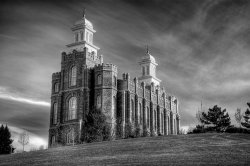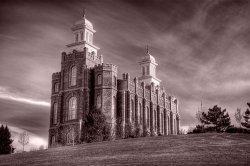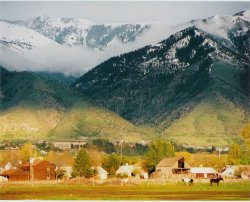Hopefully this won't get me burned at the stake…
Does anyone feel like HDR is a little bit of cheating? I think it's a great effect, and produces some really great results, but IMO if you can't capture the scene in one exposure, using a program to correct for this incapability (usually of the equipment, not the photographer) is just wrong.
My photographic ethics run by what could and couldn't (can and can't) be done in a darkroom–so if there was some way to do HDR in a darkroom, it's photography straight up; otherwise, I think it's stepping away from photography and into modern art.
If you know so much about darkrooms, then you'd know that film can capture so much more tonal range than current digital sensors are capable of capturing. In a darkroom you could indeed produce images this fantastic and surreal; provided you are good at dodging and burning. It is a bit like you said, you still have to capture the image correctly at first, but in film it's MUCH more forgiving, ESPECIALLY black and white.
HDR is not cheating, if anything, it's leveling the dynamic range playing field. However, I have to agree with the posters who said there are times when it is not appropriate and times when it hurts more than helps. I won't name names or quote pictures, but a lot of the photos posted in this thread were terrible. I looked at them and asked myself, "why did they feel the need to use the HDR process here?"
Scenes that don't naturally have a large tonal range do NOT need to be processed in HDR. It is defeating the entire purpose of the process. You should only use the HDR process when a scene contains pure blacks and pure whites, and a large amount of tones in between (or should I say VALUES). If your scene is all evenly lit, DON'T USE HDR.
It's not that hard, guys. I don't mean to sound harsh-- well, I do. But it's all about educating yourself. If you don't even know what dynamic range is, look it up. Read about film and digital sensors. Learn about it. THEN use it, IF YOU NEED TO.
Also, the reason a lot of HDR photos look so hyper-realistic is that we have been trained to accept the shortcomings of photography and what can be captured with a camera (film or digital). The human eye is capable of perceiving many more values at once than any film or sensor. A properly produced HDR image should more closely resemble what the scene actually looked like to the photographer, or the viewer if they were to be there. I will show you my example.
Boring as it seems, I thought the fog and this deforested landscape was so beautiful that I pulled my car over, and climbed a fence to shoot it. The first picture is what the camera was able to record, at EV 0, the most accurate exposure it could come up with.
pretty boring, right?
Well, since I was seeing a whole lot more color and values than the camera was, I decided to bracket the shot. I ended up taking seven shots; normal, +1, +2, +3, and -1, -2, -3.
The result is almost exactly what I saw, and I think you could better understand why I stopped, by looking at this shot, rather than the single exposure.
I would liken the second image to a painting, rather than a videogame still. Not as a compliment to my photographic abilities (it's certainly not a stellar shot), but in relation to the colors and values. Since painters usually work from life and not from photos, they capture the colors their eyes see, and are not limited by a camera's abilities (or lack thereof). Look at older landscape paintings. None would argue against their realism, yet they do not look like photographs-- they look better.















